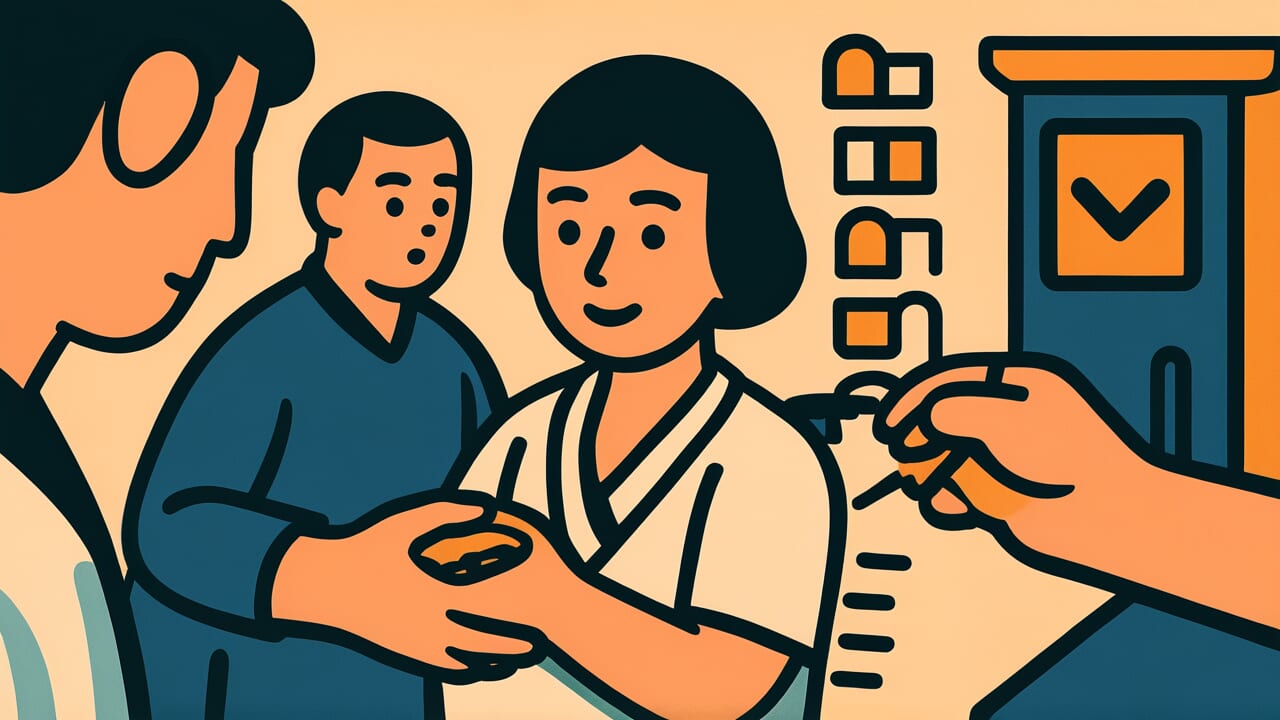How to Read “First nursing, second medicine”
いちにかんびょうににくすり
Meaning of “First nursing, second medicine”
“First nursing, second medicine” means that nursing care is more important than medicine when treating illness.
It teaches that to help a sick person recover, the first priority is having someone stay by their side to care for them. Medicine comes second.
This proverb is used in medical and caregiving situations to emphasize the importance of attentive human care, not just relying on medicine alone.
It expresses the idea that observing the patient’s condition, preparing proper meals, maintaining cleanliness, and providing emotional support enhances the effectiveness of medicine.
Sometimes this care has even greater healing power than medicine itself.
Even today, this teaching is valued in medical and nursing settings. No matter how excellent the medicine, true recovery is difficult without someone carefully observing the patient’s condition and supporting them physically and mentally.
This proverb powerfully conveys the value of human care in medicine, simply yet forcefully.
Origin and Etymology
The exact source of this proverb is unclear, but it likely spread among common people as medical wisdom from the Edo period through the Meiji period.
In those days, medicine was precious and expensive in Japan. For ordinary people, seeing a doctor or obtaining medicine was not easy.
When someone fell ill, the most important thing was for family members to provide devoted nursing care.
The expressions “first” and “second” are traditional Japanese phrases that show priority order.
Similar proverbs include “First perseverance, second perseverance,” which effectively conveys what matters most.
By placing nursing first and medicine second, this proverb emphasizes the importance of human warmth in medical care.
In times when medicine was underdeveloped, drugs had limited effectiveness. However, the presence of a caregiver gave patients peace of mind.
Caregivers provided food and water, kept the body clean, and ensured proper rest. These actions created an environment essential for recovery.
This proverb condenses practical medical wisdom born from such experiential knowledge.
Usage Examples
- When my grandmother was hospitalized, my father visited every day, saying “First nursing, second medicine” as he devotedly cared for her
- Medical technology has advanced, but my senior nurse taught me that the old teaching of “First nursing, second medicine” remains just as important today
Universal Wisdom
The proverb “First nursing, second medicine” contains deep insight into the essence of human recovery.
Why has this teaching been passed down through the ages? It’s because humans are not merely biological beings, but beings in which mind and body are closely connected.
When we become ill, not just our bodies but our hearts weaken too. Emotions like anxiety, loneliness, and fear sometimes torment us more than the illness itself.
At such times, having someone by your side to hold your hand, wipe the sweat from your forehead, and speak kind words provides tremendous strength.
Nursing is not just physical care. It’s an act of conveying the message “You are not alone.”
Our ancestors understood the healing power of human bonds better than material treatments like medicine.
The warmth of the caregiver, their very presence, awakens the patient’s will to live and enhances natural healing power.
This is a truth humanity knew from experience long before science developed.
This proverb remains timeless because it speaks an unchanging truth. No matter how much technology advances, humans need warm care from other humans.
When AI Hears This
Systems scientist Donella Meadows showed that there are twelve leverage points for changing systems.
Adjusting numbers and parameters is far less effective than changing system structure, rules, purpose, or paradigm. This proverb perfectly represents that hierarchy.
Medicine is the lowest leverage point: “adjusting material input amounts.” If the fever is 38 degrees, give one pill; if 39 degrees, give two pills.
You’re just tweaking parameters. Nursing, however, observes the entire system: the patient’s life rhythm, mental state, and environment.
It works to help the system’s true purpose—natural healing power—function properly. In other words, it’s a higher-level intervention.
What’s interesting is that modern medicine often falls into a trap here. Medical systems are optimized for low-level interventions like “prescribing medicine” because they’re easy to measure and standardize.
Nursing, a high-level intervention, is hard to quantify, takes time, and is difficult to assign insurance points to.
Yet research repeatedly shows that hospitalized patients’ recovery speed strongly correlates with nursing quality.
This proverb also serves as a warning to modern society, which emphasizes only low-level interventions in pursuit of efficiency.
Lessons for Today
This proverb teaches modern people the importance of “not losing sight of what’s essential.”
When we have convenient tools and technology, we tend to think “that’s all we need.” But what truly matters is the heart and actions of the person using those tools.
This applies not just to medical situations but to every aspect of life. In education, no matter how excellent the materials, a teacher who stays close to students comes first.
In business, no matter how wonderful the product, the attitude of sincerely facing customers is most important.
In child-rearing, no matter how good the environment, nothing surpasses the time and love parents spend with their children.
When you want to support someone, what can you do first? Perhaps it’s not preparing something expensive, but being there, listening, and reaching out your hand.
The words “First nursing, second medicine” remind us of the value of warm care that only humans can provide.



Comments